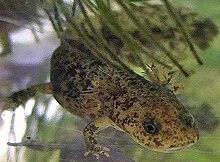The Hida salamander or Hondo salamander (Hynobius kimurae) is a species of salamander in the family Hynobiidae, the Asiatic salamanders. It is endemic to central and western Honshu, Japan.[2] It lives in deciduous, coniferous, and mixed forests, where it breeds in streams.[1] The egg sacs of this species were reported to display blue-to-yellow iridescent glow due to a quasi-periodic diffraction grating structure embedded within the enveloppes of the egg sacs.[3] These salamanders typically spawn from February to April, leading some to metamorphose in late September while others wait for the following year to do so after winter is over.[4]
| Hida salamander | |
|---|---|

| |

| |
| Scientific classification | |
| Domain: | Eukaryota |
| Kingdom: | Animalia |
| Phylum: | Chordata |
| Class: | Amphibia |
| Order: | Urodela |
| Family: | Hynobiidae |
| Genus: | Hynobius |
| Species: | H. kimurae
|
| Binomial name | |
| Hynobius kimurae Dunn, 1923
| |
| Synonyms[2] | |
| |
References
editWikimedia Commons has media related to Hynobius kimurae.
- ^ a b IUCN SSC Amphibian Specialist Group (2021). "Hynobius kimurae". IUCN Red List of Threatened Species. 2021: e.T188970983A177183757. doi:10.2305/IUCN.UK.2021-1.RLTS.T188970983A177183757.en. Retrieved 16 November 2021.
- ^ a b Frost, Darrel R. (2018). "Hynobius kimurae Dunn, 1923". Amphibian Species of the World: an Online Reference. Version 6.0. American Museum of Natural History. Retrieved 4 July 2018.
- ^ Zabuga, Aleksandra V.; Arrigo, Marcelle I.; Teyssier, Jérémie; Mouchet, Sébastien R.; Nishikawa, Kanto; Matsui, Masafumi; Vences, Miguel; Milinkovitch, Michel C. (7 February 2020). "Translucent in air and iridescent in water: structural analysis of a salamander egg sac". Soft Matter. 16 (7): 1714–1721. Bibcode:2020SMat...16.1714Z. doi:10.1039/C9SM02151E. PMID 32031549.
- ^ Matsui, Masafumi & Misawa, Yasuchika (1997). "Larval life history variation in two populations of the Japanese salamander Hynobius kimurae (Amphibia, Urodela)". Zoological Science. 14 (2): 257–262. doi:10.2108/zsj.14.257. hdl:2433/65056. ISSN 0289-0003.
